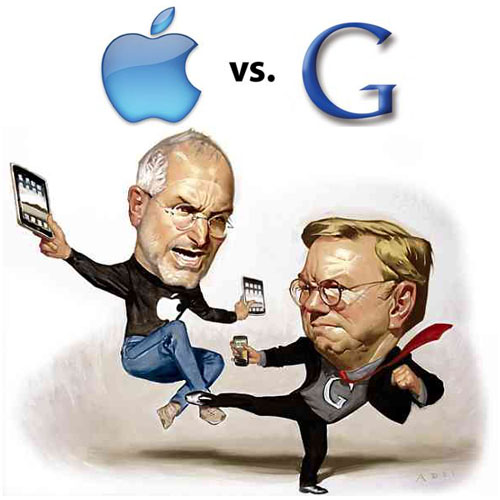How Apple's Strategies Could Benefit Google In The Long Run

Table of Contents
Google and Apple are often portrayed as arch-rivals, locked in a perpetual struggle for technological supremacy. However, a deeper analysis reveals that Google could significantly benefit from strategically incorporating aspects of Apple's business model. This article explores how specific elements of Apple's strategies—from prioritizing user experience to its vertically integrated ecosystem—could provide Google with a substantial competitive advantage in the long term.
Learning from Apple's Focus on User Experience (UX)
Apple's enduring success is fundamentally rooted in its unwavering commitment to intuitive and user-friendly interfaces. Google, despite its vast technological prowess, could significantly enhance its product offerings by emulating this focus. This involves simplifying complex services, streamlining user onboarding, and dedicating substantial resources to UX research.
Prioritizing Seamless User Interfaces
Apple’s reputation for seamless user interfaces is unparalleled. Google can learn from this by focusing on several key areas:
- Improve the user experience of Google's Android operating system: Addressing fragmentation and creating a more consistent, intuitive experience across all Android devices is paramount. This would involve closer collaboration with manufacturers and a more streamlined update process.
- Invest more in user research: Deepening understanding of user needs and pain points across all Google products and services is crucial. This involves conducting extensive user testing and incorporating user feedback into the design process.
- Simplify the user interface of Google services: Services like Google Search, Google Maps, and Gmail could benefit from a more streamlined, less cluttered interface, making them more accessible to a wider user base, including less tech-savvy individuals.
The Power of a Holistic Ecosystem
Apple’s tightly integrated ecosystem—where devices and services work seamlessly together—is a key driver of its success. Google should aim for a similar level of synergy across its diverse product portfolio.
- Improve interoperability between Google services: Seamless integration between Google Assistant, Google Maps, Google Calendar, and other services would create a more cohesive user experience and increase user engagement.
- Develop more tightly integrated hardware and software experiences: Moving beyond the fragmented nature of the Android ecosystem requires more control over hardware specifications and closer collaboration with hardware manufacturers.
- Focus on user data privacy and security: Mirroring Apple’s emphasis on user privacy and security within its integrated ecosystem would foster greater user trust and loyalty.
Adopting Apple's Approach to Hardware and Vertical Integration
While Google excels in software, strategically expanding its hardware portfolio, similar to Apple’s approach, could strengthen its overall ecosystem and provide a more holistic user experience.
Expanding Hardware Capabilities
Google's hardware strategy could benefit from a more Apple-like approach:
- Invest further in its Pixel phone lineup: Focusing on superior user experience and differentiation rather than solely on cost efficiency would enhance brand perception and customer loyalty.
- Explore expansion into new hardware markets: Mirroring Apple's success with wearables (Apple Watch) or smart home devices (HomePod) could open new revenue streams and enhance ecosystem integration.
- Develop more proprietary hardware components: This would improve control over performance, quality, and feature integration across Google's hardware and software offerings.
Controlled Hardware-Software Integration
Apple's control over both hardware and software is a key source of its success. Google can leverage a similar model:
- Develop more sophisticated hardware-software partnerships: This would allow for better optimization of core Google services on Android devices, improving performance and user experience.
- Increase internal development of critical hardware components: Reducing reliance on third-party manufacturers would enhance quality control and allow for more innovative hardware designs.
- Develop a more effective strategy for managing and updating Android OS: Emulating Apple's control over iOS updates would ensure a more consistent and secure user experience across a wider range of Android devices.
Emulating Apple's Brand Loyalty and Premium Pricing Strategy
Apple’s strong brand identity fosters exceptional customer loyalty and allows for premium pricing. Google can improve its branding to cultivate a similar image of innovation and quality.
Building a Strong Brand Identity
Creating a stronger brand identity requires a multi-pronged approach:
- Emphasize quality and design: Moving beyond a purely functional approach and focusing on the aesthetic appeal and overall user experience of its products is key.
- Develop consistent brand messaging: Maintaining a consistent brand message across all Google products and services would reinforce brand recognition and build stronger customer relationships.
- Invest more in brand building and marketing: Creating a premium brand image similar to Apple requires substantial investment in marketing and advertising campaigns that effectively convey Google's brand values.
Justifying Premium Pricing
Apple successfully justifies higher prices with superior quality and user experience. Google can adopt a similar pricing strategy:
- Focus on superior user experience: Providing features and functionalities that clearly justify higher prices for Google services and hardware is essential.
- Implement stronger quality control measures: Minimizing software bugs and hardware malfunctions would improve user satisfaction and build trust in the brand.
- Highlight the value proposition of Google services: Emphasizing the time and money saved by using Google services would clearly communicate the value for money offered to consumers.
Conclusion
While Google and Apple operate in distinct areas of the tech landscape, Google can undoubtedly benefit from adopting certain aspects of Apple's strategic playbook. By focusing on superior user experience, a more tightly integrated ecosystem, strategic hardware expansion, and cultivating a stronger brand identity, Google can significantly enhance its long-term competitiveness. This isn't about direct imitation, but rather about identifying and implementing best practices to build a more robust and user-centric ecosystem. Embracing these key elements of Apple's strategies could unlock substantial growth potential for Google. Are you ready to explore how Apple's strategies can benefit your business?

Featured Posts
-
 Mm Amania Coms Ufc 315 Betting Odds Analysis Weekend Picks
May 11, 2025
Mm Amania Coms Ufc 315 Betting Odds Analysis Weekend Picks
May 11, 2025 -
 Boris Johnson Y El Incidente Con Un Avestruz En Texas Detalles De La Visita Familiar
May 11, 2025
Boris Johnson Y El Incidente Con Un Avestruz En Texas Detalles De La Visita Familiar
May 11, 2025 -
 Tom Cruises Dating History A Comprehensive Look At His Relationships
May 11, 2025
Tom Cruises Dating History A Comprehensive Look At His Relationships
May 11, 2025 -
 Whoops Free Upgrade Debacle A Look At User Complaints
May 11, 2025
Whoops Free Upgrade Debacle A Look At User Complaints
May 11, 2025 -
 Ufc 315 Muhammad Vs Della Maddalena Full Fight Card Date Time And Viewing Guide
May 11, 2025
Ufc 315 Muhammad Vs Della Maddalena Full Fight Card Date Time And Viewing Guide
May 11, 2025
